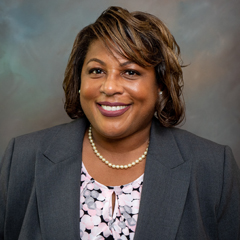Confidential Advisors
Louisiana State University of Alexandria is committed to providing confidential, nonjudgmental and appropriate support services for all sexual assault survivors, regardless of gender, ethnicity, sexual orientation, age, ability, or whether or not they
report the crime. In addition, the University has a vested interest in obtaining an accurate account of the number of sexual assaults occurring on- or off-campus involving student survivors.

Connie Cooper
(318) 473-6558ccooper@lsua.edu
Mulder Hall, Office #326

Ethan Lipsey
(318) 619-2973elipsey@lsua.edu
Bo Nipper, Room 102

Twana Chestand
(318) 427-0101tchestand@lsua.edu
Student Center - W210
A confidential advisor is an individual designated as a resource to provide support and assistance to students, faculty, and staff members before and/or during a sexual misconduct complaint process. Communications with confidential advisors are deemed to be confidential and will be kept as such, except in circumstances where disclosure by the University or advisor may be required by state and/or federal laws. Confidential advisors may be present during any meeting conducted under PM-73 (Title IX and Sexual Misconduct Policy) to assist and/consult with a student or employee. Confidential advisors may not act as a spokesperson.
- Complainant & Respondent Information
- Responsible Employee Information
- Consent
- Bystander Intervention
Medical Options:
The first 96 hours after an assault are critical to the preservation and collection of forensic evidence. It is also a critical time for medical treatment for potential pregnancy or transmission of infections. Survivors are often scared to have the forensic exam because they are unsure about what will happen, particularly regarding filing a police report and pressing charges. However, without a forensic exam conducted in the first 96 hours, crucial evidence could be lost and the survivor's legal case may be significantly weakened. A police report will be taken at the time of the exam and the state will follow through with investigating the crime. If a survivor is unsure about whether or not to press charges, the state will hold the forensic evidence for 30 days.
To preserve the physical evidence:
- Do not bathe or douche.
- Do not brush teeth or ingest food/beverages.
Do not change clothes if possible and do not wash the clothes worn at the time of the assault. Those clothes are considered forensic evidence and will be collected by the forensic examiner at the hospital. If a survivor doesn't want to wear those clothes to the hospital, s/he can take them to the hospital in a paper bag. Do not use a plastic bag because it may "break down" evidence.
To preserve the crime scene:
The space where the assault occurred is considered a crime scene. The
police will gather additional evidence from the scene once charges are
filed. If the assault occurred in a residence hall or other building on
campus. Housing relocation is an option for any survivor who lives
on-campus.
Non-Forensic Care:
It is recommended that a survivor get medical attention even if s/he
decides not to have a forensic exam. The survivor may seek treatment
through her/his private physician or the Student Health Center.
Treatment options can include emergency contraception and
testing/treatment for potential sexually transmitted infections.
Legal Options:
Sexual Assault Survivors have the option of processing their case
through the civil and/or criminal judicial system. Cases can be
processed through each system concurrently or separately. To prosecute a
sexual assault or dating violence crime or to get a protective order
through the civil or criminal system, it's best to consult with law
enforcement.
University Judicial System:
The University Judicial system is designed to be educational in nature
and can only affect the accused student's status as a University
student. A student who is found in violation of Student code of conduct
cannot be sent to jail through the University judicial process.
However, the student can potentially be suspended or expelled, among
other sanctions, if found responsible for violating any University
Policies.
To file a complaint, contact the Office of the Vice Chancellor of
Academic Affairs. A formal complaint must be filed in order for the
University to investigate the allegation. However, a survivor may meet
with any of the confidential advisors to ask questions without filing a
formal complaint.
Non-Discrimination Statement
Louisiana State University of Alexandria does not discriminate on the basis or race, color, creed, or religion, national or ethnic origin, sex, sexual orientation, marital status, gender identity, age, genetics information, physical or mental disability, status as a protected veteran, or any other non-merit fact in the admission to, participation in, or employment in the programs and activities which the University operates.
Title IX Staff
Daniel Manuel, M.A.Title IX Coordinator
(318) 427-0137
TitleIXCoordinator@lsua.edu
Kristen Meche-Miller
Deputy Title IX Coordinator
(318) 473-6402
kmiller@lsua.edu
Office: Abrams Hall 115
On-Campus Resources
- Student Services
- LSUA Campus - Student Center
- Counseling Services
- West Wing, Room W206
- Phone: (318) 767-2604
- LSUA Health Center
- LSUA Campus - Coughlin Hall
- East Wing
- Phone: (318) 427-0140
- University Police
- 8210 Tom Bowman Drive
- Phone: (318) 473-6410
- Email: universitypolice@lsua.edu
- Confidential Ethics Helpline
- Phone: (855) 561-4099